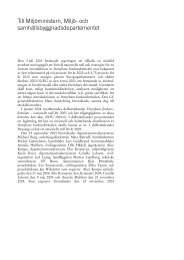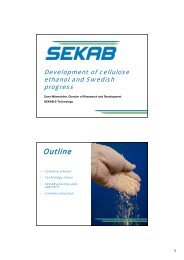Sugarcane ethanol: Contributions to climate change - BAFF
Sugarcane ethanol: Contributions to climate change - BAFF
Sugarcane ethanol: Contributions to climate change - BAFF
You also want an ePaper? Increase the reach of your titles
YUMPU automatically turns print PDFs into web optimized ePapers that Google loves.
Chapter 9<br />
3.8. Improving efficiency, access <strong>to</strong> technology, credit and channelling investment<br />
�e development of a successful bio<strong>ethanol</strong> sec<strong>to</strong>r goes beyond having available land, cheap<br />
labour and good <strong>climate</strong>. It crucially depends on countries’ domestic capacity <strong>to</strong> expand<br />
production e�ciently, accessing the technology and assuring best practice. Indeed, Brazil’s<br />
success in developing an e�cient bio<strong>ethanol</strong> industry is in a large extent explained by the<br />
enormous endogenous e�orts devoted <strong>to</strong> R&D, capacities building and infrastructure (Dufey<br />
et al., 2007a). �is implies that having a number of technical skills for research, technology<br />
transfer as well as access <strong>to</strong> credit are critical issues. Moreover, those countries wanting <strong>to</strong><br />
develop an export oriented sec<strong>to</strong>r also need <strong>to</strong> be in compliance with the relevant technical<br />
standards in importing markets and <strong>to</strong> invest in suitable transport infrastructure (roads,<br />
water ways and ports) <strong>to</strong> reach exports markets. Countries also need <strong>to</strong> have su�cient<br />
capacity in policy implementation and project management <strong>to</strong> run biofuels production and<br />
processing e�ectively (Dufey et al., 2007b).<br />
At present, many countries foresee a major participation of the sugar industry in bioenergy<br />
production. However, the current low e�ciency and productivity of the sec<strong>to</strong>r in many<br />
of them implies that major <strong>change</strong>s <strong>to</strong> the industry’s structure will be needed <strong>to</strong> make<br />
sugarcane an important feeds<strong>to</strong>ck (FAO, 2007). In countries where bio<strong>ethanol</strong> is produced<br />
from molasses and wanting a signi�cant scale of production, e�orts will need <strong>to</strong> be made<br />
<strong>to</strong> produce from sugarcane juice, which is a relatively more e�cient source of bio<strong>ethanol</strong><br />
and capable of supplying larger volumes (Woods and Read, 2005). Other speci�c needs<br />
include adaptive agricultural research and extension development for enhanced transfer<br />
of bio<strong>ethanol</strong> technologies. Investment is also important <strong>to</strong> bring agricultural practices up<br />
<strong>to</strong> the required level of technical capacity, scale of operations, and intensity of production<br />
(Johnson and Rosillo-Calle, 2007)<br />
4. Conclusions<br />
<strong>Sugarcane</strong> bio<strong>ethanol</strong> can contribute <strong>to</strong> the achievement of several Millennium Development<br />
Goals through a varied range of environmental, social and economic advantages over fossil<br />
fuels. �e highest impact on poverty reduction is likely <strong>to</strong> occur where sugarcane bio<strong>ethanol</strong><br />
production focuses on local consumption, involving the participation and ownership of<br />
small farmers and where processing facilities are near <strong>to</strong> the cultivation �elds.<br />
Realising the greatest potential of sugarcane bio<strong>ethanol</strong> on poverty reduction implies that<br />
several challenges will need <strong>to</strong> be confronted and dealing with serious trade-o�s. Especially<br />
<strong>to</strong>ugh will be those related <strong>to</strong> e�ciency gains through large-scale operations, mechanisation<br />
and land concentration versus small farmers inclusion. Economies of scale are important<br />
and small farmers will need <strong>to</strong> adapt and get organised <strong>to</strong>wards that direction. Likewise, the<br />
resulting unemployment among the lower-skilled workers is a key aspect <strong>to</strong> be addressed.<br />
Whilst the domestic use of sugarcane bio<strong>ethanol</strong> may imply opportunities in terms of<br />
220 <strong>Sugarcane</strong> <strong>ethanol</strong>












